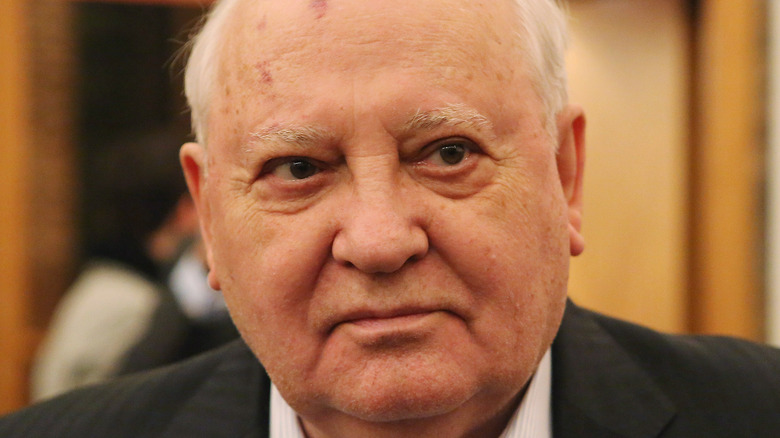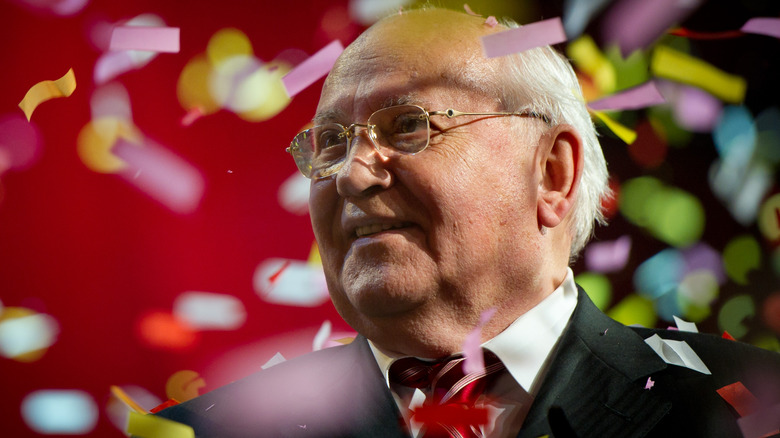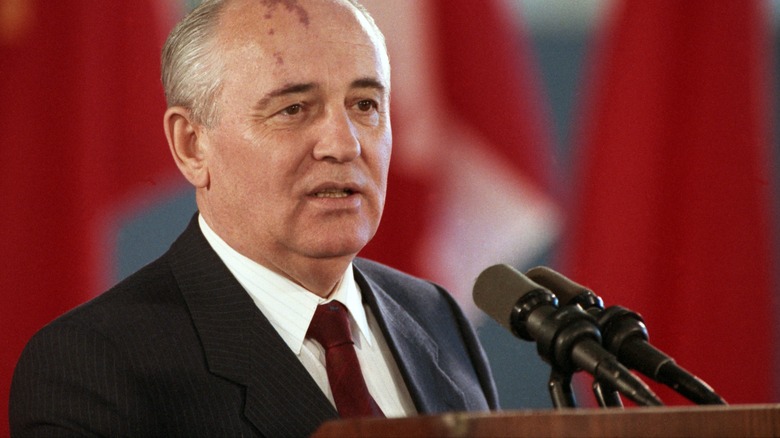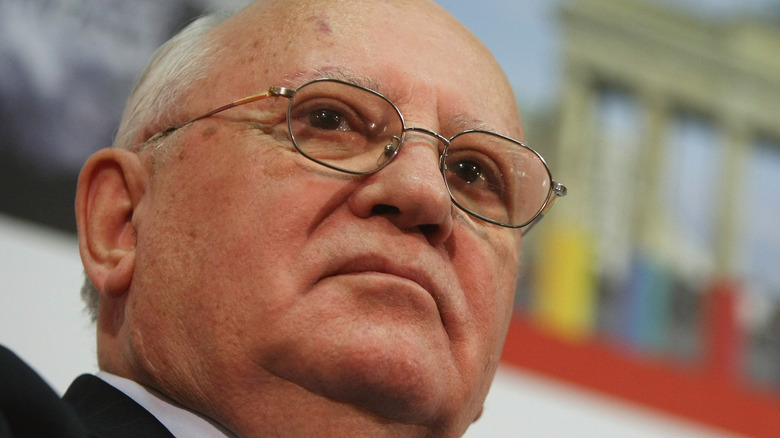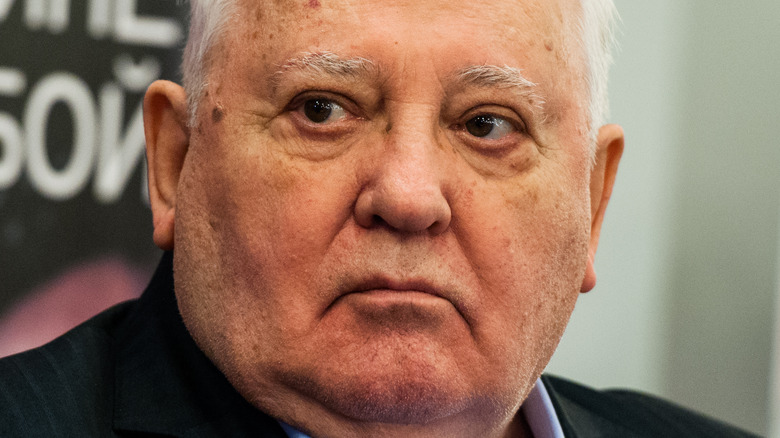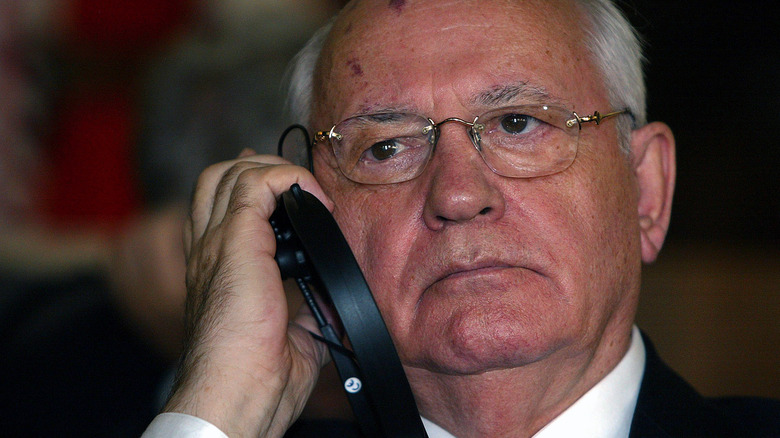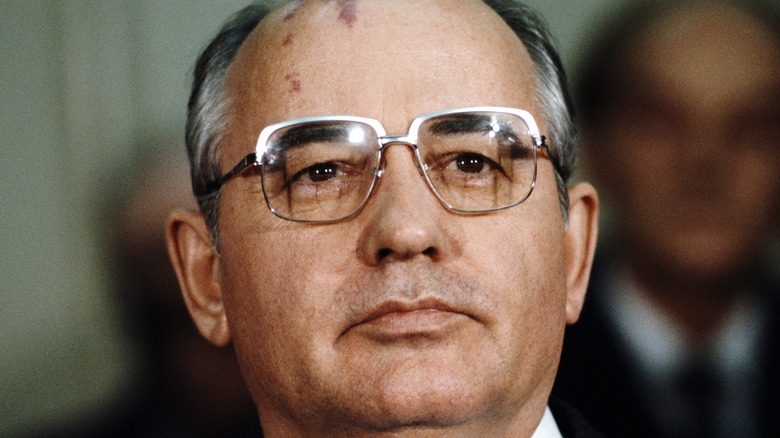Details We Know About Mikhail Gorbachev's Death
Former Soviet Union leader Mikhail Gorbachev has died at the age of 91. The political icon's 1991 resignation marked the end of the USSR, per Politico, after the leaders of Russia, Ukraine, and Belarus fought for their independence and refused to recognize the state any further — Gorbachev had been in power since 1985. The repercussions of his resignation are still being felt today, particularly given the ongoing crisis with neighboring nation Ukraine.
The beloved leader confirmed the shocking move in a live, televised address broadcast to the nation (Gorbachev was widely expected to fight to the end). He admitted in his memoirs, "I still regret that I failed to bring the ship under my command to calm waters, failed to complete reforming the country." Although the fall of the Soviet Union was inevitable, as CNN notes, Gorbachev made major strides establishing Russia as a player in global politics.
The late politician may have felt as though he let everybody down, but in the end Gorbachev will be remembered for what he managed to achieve, rather than what he didn't.
Gorbachev died after battling illness
Mikhail Gorbachev's long and impressive life of public service came to an end on August 30, as he succumbed to health difficulties. The former Soviet leader was in Moscow at the time of his death, having battled "a long illness." The details of his death, and added information about his health condition, are developing as of publication. The Central Clinical Hospital confirmed his passing.
Mikhail Gorbachev continued warning world leaders about the dangers of nuclear war
One of Mikhail Gorbachev's biggest passions in life was establishing a better relationship between Russia and the rest of the world, particularly the United States. In a 2019 interview with the BBC, the still-sharp former leader warned that, "As long as weapons of mass destruction exist, primarily nuclear weapons, the danger is colossal." Gorbachev encouraged world leaders to come together and demand the immediate dismantling of these weapons, rather than waiting for the worst to happen.
During his reign, Gorbachev brokered a historic deal with then-President Ronald Reagan to cut both countries' nuclear arsenals down considerably. Unfortunately, the United States and Russia both went back on their word in recent years, reigniting fears of an inevitable nuclear war. In a 2014 interview with TIME, Gorbachev warned that Russia was entering into "a new Cold War" with the West, particularly following the annexation of Crimea, which further isolated Russia from the rest of the world.
World leaders championed Mikhail Gorbachev on his 90th birthday
When former Soviet leader Mikhail Gorbachev was gearing up to celebrate turning 90 in 2021 — over Zoom, naturally, given pandemic restrictions at the time — he was celebrated by Russian leader Vladimir Putin as an "outstanding statesman," per Reuters. In a telegram, published on the official Kremlin website, Putin championed Gorbachev for having "had a significant influence on the course of domestic and world history."
Congratulatory messages were also sent in by British Prime Minister Boris Johnson, President Joe Biden, and German Chancellor Angela Merkel, all of whom no doubt recognized Gorbachev's undeniable contribution to global politics. A play about his life was notably staged in Moscow, at which several spectators shared their appreciation for Gorbachev. However, others still felt he was solely to blame for the breakup of the Soviet Union.
The former leader consistently warned that Russia and America, in particular, needed to keep their lines of communication open and Gorbachev's popularity on the world stage exemplified how he, personally, was victorious in that respect.
This is how Mikhail Gorbachev's interpreter described working for him
According to Pavel Palazhchenko, Mikhail Gorbachev's former interpreter — who lived through the culmination of the Cold War and even worked to relay messages from both sides — with the Russian invasion of Ukraine ongoing, world leaders need to remember the lessons they learned all those years ago. "We still have this experience of two nations that are very widely apart on many issues working together to address some of the challenges that the world is facing today," Palazhchenko explained, per Fox News. He argued that, without working together, future crises are going to be much harder to tackle.
Palazhchenko also touched on the experience of working for Gorbachev, admitting he appreciated the experience even though it wasn't easy all the time. The interpreter recalled how, at the end of the Cold War, President Ronald Reagan confirmed the Soviet Union was no longer "an evil empire," which meant everything to him. Palazhchenko especially enjoyed watching the relationship between Reagan and Gorbachev flourish, although they obviously didn't always see eye to eye. Mostly, though, he was happy the two found common ground in curbing the use of nuclear weapons across the board.
Russia came down hard on a newspaper co-founded by Mikhail Gorbachev
As Radio Free Europe Radio Liberty notes, although Mikhail Gorbachev failed to make the Soviet Union work, nostalgia for that period in time remains high, particularly considering the former leader's humble origins. His influence is still being felt throughout Russia too, even during a dark period for the country. As Newsweek reported, the final major independent news outlet in the region, which was founded by Gorbachev and is currently run by Nobel prize recipient Dmitry Muratov, who coincidentally won for his work "fighting for press freedom," was forced to halt production after receiving a number of warnings from the government about their ongoing coverage of the crisis in Ukraine.
A new law had only recently been enacted to halt the reporting of so-called fake news, in other words anything containing words like "war" and "invasion" when describing Russia's actions in the neighboring country, which was even punishable by prison time. Ukrainian Presidential Advisor Mykhailo Podolyak decried the move on Twitter, pointing out that, by essentially forcing the outlet to suspend operations, Russia had been left as "a country without media." He added, "This is the modern [Russian Federation]. That is why Russians do not see, hear or realize anything. No matter what language you speak to them."
Mikhail Gorbachev accused the US of being 'arrogant'
In a chat with state news agency RIA Novosti, via CBS News, former Soviet leader Mikhail Gorbachev railed against the expansion of NATO, which current President Vladimir Putin has consistently criticized over the years for getting too close to Russian borders. Pointing to how thrilled everybody allegedly was in the U.S. when the Soviet Union fell, Gorbachev argued, "They grew arrogant and self-confident. They declared victory in the Cold War."
As far as the world-renowned political commentator was concerned, it's impossible for Russia to trust the United States when they keep moving the goalposts. Gorbachev opined that Mosco and Washington had to work together to cease the use of nuclear weapons, and to move forward towards a better future for all citizens. Unfortunately, "the 'winners' decided to build a new empire. Hence the idea of NATO expansion."
He remained hopeful that Russia and the U.S. could come to an agreement in the future, however, since their collaboration was imperative for the future of the world.
